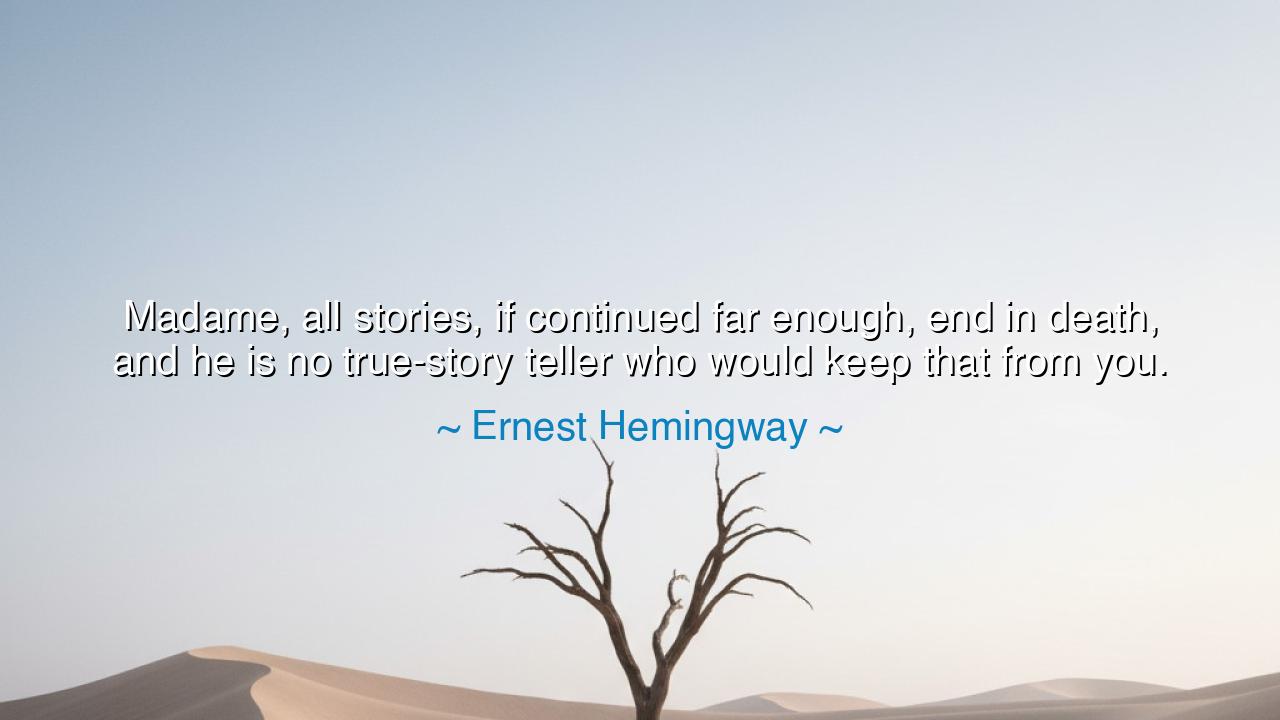
Madame, all stories, if continued far enough, end in death, and
Madame, all stories, if continued far enough, end in death, and he is no true-story teller who would keep that from you.






“Madame, all stories, if continued far enough, end in death, and he is no true-story teller who would keep that from you.” — thus spoke Ernest Hemingway, the master of truth stripped bare of ornament, whose pen carved life as it was: fierce, fragile, and fleeting. In this single line, uttered with the simplicity of a confession, Hemingway reveals the deepest law of existence — that every tale, no matter how glorious, no matter how tender, must one day find its ending in death. To deny this is to lie, not only in art, but in life itself. For death, the great equalizer, stands at the end of every human sentence, and only those who dare to write with that knowledge in their hearts can tell stories that truly live.
The origin of this quote lies in Hemingway’s philosophy of realism — his lifelong crusade to speak the truth without fear or embellishment. He belonged to a generation shattered by war, a witness to the carnage of the twentieth century, where idealism had drowned in blood. To him, the task of the writer was not to comfort, but to confront — to face life’s inevitabilities and render them honestly. Thus he says, “no true storyteller would keep that from you,” for the writer who hides death is no teller of truth, but a weaver of illusions. For Hemingway, a story without mortality is a story without meaning, for it ignores the one shadow that gives shape to all light.
The ancients, too, knew this wisdom well. Homer, in the Iliad, did not shy away from the finality of death — he made it the very heartbeat of the poem. Achilles, knowing he is destined to die young, chooses glory over comfort; Hector, facing him, fights not to win but to die nobly. Their fates are sealed, and yet it is precisely this knowledge — that death cannot be escaped — that makes their lives radiant. The poet who refuses to tell of death robs his heroes of their humanity, for to live without death is not to live at all, but to dream without waking. Hemingway, the modern heir to Homer’s truth, understood this deeply. His characters — soldiers, fishermen, lovers, exiles — are all mortals aware of the ticking clock. They struggle, they bleed, they endure, and in their endurance, they are beautiful.
There is a certain honor in Hemingway’s vision. He does not glorify death; he acknowledges it as the rightful conclusion of life’s story. To tell the truth of death is not to dwell in despair, but to affirm the value of every moment before it. When one accepts that all stories end in death, one begins to live with urgency, with gratitude, with courage. The farmer tends his field more carefully when he knows winter will come. The lover cherishes his beloved more fiercely when he knows time is fleeting. To pretend immortality is to live carelessly; to face mortality is to live consciously.
Consider the life of Socrates, who, when condemned to death, drank the hemlock with calm resolve. He did not curse the end of his story, for he had long accepted that wisdom and mortality are bound together. In his final moments, he continued to teach, to comfort his friends, and to meet death as he met life — with integrity. Socrates, like Hemingway, knew that the true philosopher, like the true storyteller, must never lie about the nature of life. Both recognized that death does not negate meaning — it completes it.
Hemingway’s words also carry a moral warning for those who live in denial. Modern man, he suggests, hides from death — in distractions, in luxuries, in stories that promise eternal happiness. But such avoidance is a form of cowardice. The ancients did not turn their eyes from the grave; they built their wisdom around it. The Egyptians, who entombed their kings with reverence, believed that death was not the end but the passage to eternity. The Stoics, like Marcus Aurelius, meditated daily on death to remain humble and clear-minded. They understood what Hemingway reminds us of: that to look at death without flinching is to become truly alive.
And so, my child, let this be the lesson: do not fear the end of your story. Embrace it as part of the whole. To live wisely is to live in awareness of death — not in dread, but in reverence. When you love, love knowing it will end. When you work, labor as though your time is short. When you tell your story, tell it truthfully, without pretending that endings do not exist. For only by acknowledging death can we understand the worth of life.
As Ernest Hemingway teaches, a story that denies death is not a true story — and a life that denies it is not a true life. Therefore, live as the ancients lived: with courage, with clarity, and with the knowledge that every heartbeat is a gift borrowed from eternity. When your story ends, let it end not in regret, but in truth. For in truth — even the truth of death — there is beauty, there is peace, and there is immortality of another kind: the immortality of a life honestly lived.






AAdministratorAdministrator
Welcome, honored guests. Please leave a comment, we will respond soon